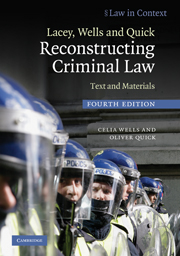Book contents
- Frontmatter
- Contents
- Preface
- Table of cases
- Table of statutes
- Section I Approaching Criminal Law
- Section II Law, Order and Security
- Section III Interpersonal Violence; Drugs and Alcohol Abuse; Offence Preparation and Participation
- 8 Offences Against the Person
- 9 Drug and Alcohol Abuse
- 10 Offence Preparation and Participation
- Section IV Property and Propriety
- Section V Regulating Sexuality and Bodily autonomy
- Section VI Making a Killing
- Bibliography
- Index
- References
10 - Offence Preparation and Participation
from Section III - Interpersonal Violence; Drugs and Alcohol Abuse; Offence Preparation and Participation
Published online by Cambridge University Press: 05 June 2012
- Frontmatter
- Contents
- Preface
- Table of cases
- Table of statutes
- Section I Approaching Criminal Law
- Section II Law, Order and Security
- Section III Interpersonal Violence; Drugs and Alcohol Abuse; Offence Preparation and Participation
- 8 Offences Against the Person
- 9 Drug and Alcohol Abuse
- 10 Offence Preparation and Participation
- Section IV Property and Propriety
- Section V Regulating Sexuality and Bodily autonomy
- Section VI Making a Killing
- Bibliography
- Index
- References
Summary
Criminal law recognises two distinct types of involvement in crime which can be described as inchoate modes and complete modes. Inchoate modes are those such as attempt to commit a crime, conspiring with others, and assisting or encouraging others to commit crimes. With the exception of attempt, these inchoate modes are methods of widening the net to include those who help others to commit offences. They are ‘inchoate’ (which means ‘to begin with’ or ‘to make a beginning’) and are not dependent on any offences actually being committed. But just as some people set out to commit offences that are never complete, or encourage or assist others who ultimately do not go on to commit offences, very often offences are committed with the active help – or participation – of others. Participation modes of liability are known by a number of different terms – aiding and abetting, secondary liability, complicity. There is also a specific form known as joint enterprise. What unites these completed forms of participation is that there needs first of all to have been an offence committed and from this follows the secondary liability of the person who participated. Such a person is treated as if they had themselves committed the offence.
- Type
- Chapter
- Information
- Lacey, Wells and Quick Reconstructing Criminal LawText and Materials, pp. 292 - 336Publisher: Cambridge University PressPrint publication year: 2010



